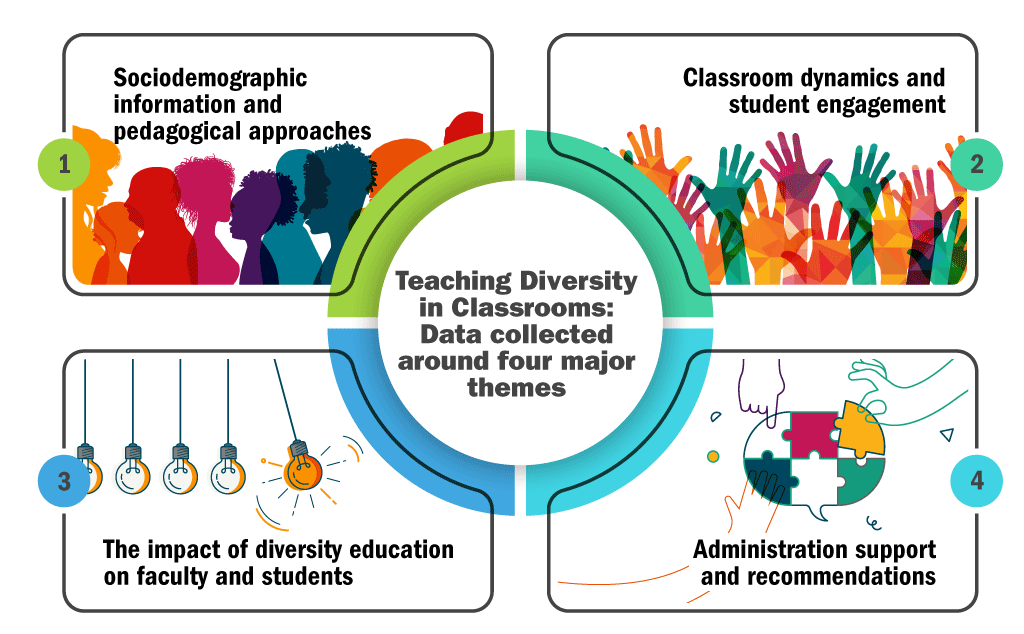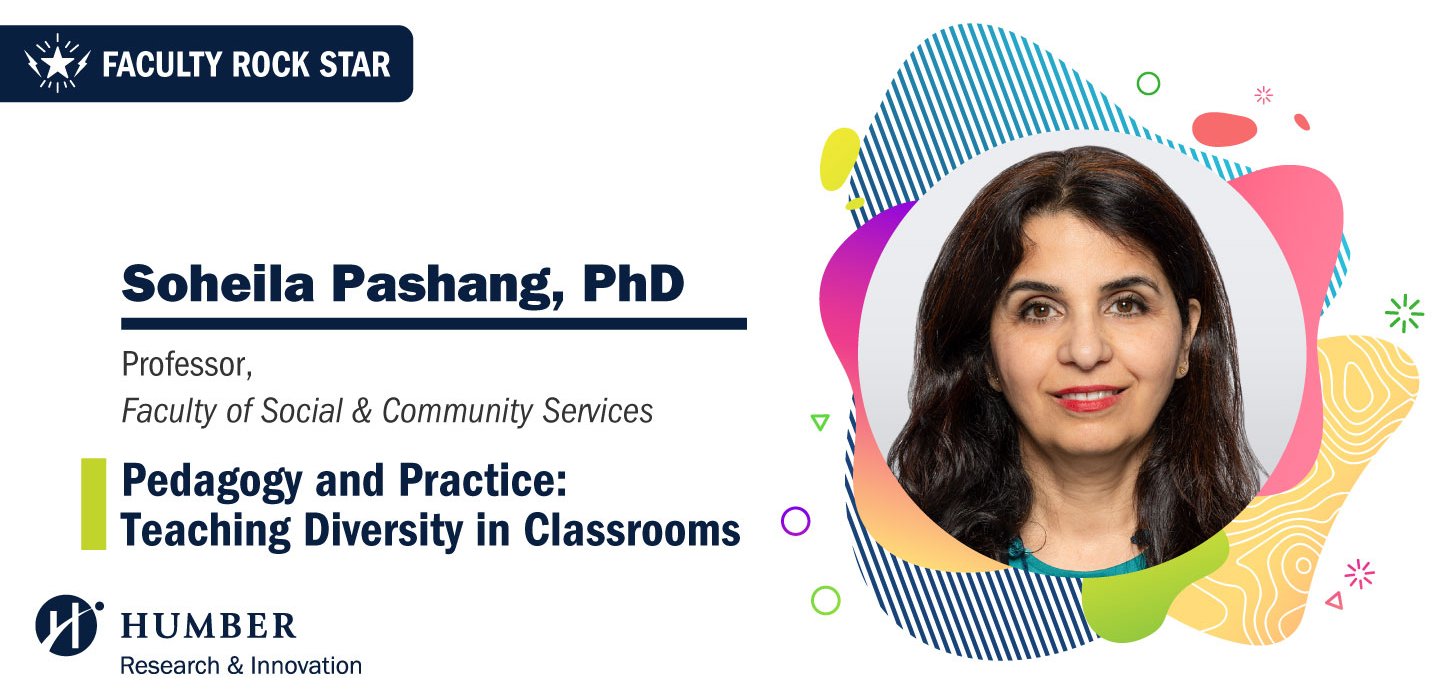Dr. Soheila Pashang reflects on her research about teaching diversity, the importance of equitability, and the power of student involvement.
Soheila Pashang has spent more than 14 years teaching and researching social justice. As a professor in the Faculty of Social and & Community Services (FSCS) at Humber College, she is committed to teaching, learning, and expanding the conversation around diversity. Soheila notes, “Diversity is considered a sensitive topic, but it should not be. It is part of our reality in life.” It was her commitment to diversity that ignited her latest research, Pedagogy and Practice: Teaching Diversity in Classrooms.
When asked where the initial spark for her research idea came from, Soheila shares that the idea came from the challenges she encountered in her classroom. She recalls, “Teaching a class on diversity was more challenging than teaching other courses. As a professor, I found myself constantly having to manage the classroom dynamic around topics students had strong views on.” As the diversity course completed at the end of the semester, Soheila was inspired to unpack the topic within the context of pedagogy. When she reached out to her colleagues Rai Reece and Tonia Richard, and the faculty administration with her research topic, her idea had been met with all-out support.
Many academic institutions in Canada take pride for their diverse campus communities without exploring the experiences of faculty teaching diversity education or students attending their classes. Soheila highlights, “Our research is among a very few in Canada to explore barriers that might hinder diverse groups of students from reaching their potential.”
“Having administration committed to social justice was instrumental to the project – their support made it a major project that I had not envisioned at the beginning.” – Soheila Pashang
This is a prominent example of Humber College’s dedication to supporting research projects under the umbrella of the Scholarship of Teaching and Learning (SoTL), now incorporated into the family of Humber’s Office of Research & Innovation (ORI). With funding from SoTL’s then-Teaching Innovation Fund (now restructured and replaced by ORI as the Seed and Cultivate Research and Innovation Funds), the research project started in 2018 and became a collaborative, multi-year endeavour.

“When diversity is not a priority, and these students don’t feel included, they’re more likely to not participate and feel inferior to their peers.” (Truong, 2020)
The research team applied anti-racism, anti-oppression, intersectionality, feminist, and equity theoretical frameworks; and utilized these theories in order to situate this research in existing teaching and curriculum practice, as well as to locate and understand the various ways in which diversity education impacts students and faculty inside and outside classroom spaces. This was possible by applying anti-colonial and decolonizing theory to examine the benefits of diversity in education and cross-pollinates with current classroom praxis and our wider society (Dei and Asgharzadeh, 2001).
As the research progressed, Soheila notes, the interviews with the faculty and survey responses from students became a valuable avenue to learn more about the unspoken challenges and untapped opportunities that can be used for improving the pedagogy of social justice.
“Studies have examined student and faculty perceptions of the educational benefits of diversity, the links between monetary and nonmonetary returns to students, schools, and society and their diversity experiences in college, as well as the links between diversity experiences in college and various benefits. Most of the findings from the research in this field suggest that experiences with diversity in higher education result in significant benefits on learning and democracy outcomes.” (Shaw, 2005)
A faculty member who participated in the research observed, “Students avoid engaging in class discussions, fearing of being politically incorrect, hurting other students or when discussing ‘hard topics.’ We need to tackle and confront in a respectful way for meaningful change.” A racialized student participant suggested, “The topic of diversity is complex and often overused nowadays. But the use of the word ‘diversity’ means more and demands more than what meets our eyes.”
As a reflection on the research process, Soheila states that faculty and researchers have the responsibility to constantly learn, de-learn, and stay up-to-date not just with the latest theoretical framework but also with the insights shared by diverse groups of students. Soheila asserts that both the faculty and students have critical roles in building an equitable learning environment.
“The important part is not necessarily the topic discussed in the classroom but rather the moment students start working together in a shared learning space.” – Soheila Pashang
The research project team is an excellent example of the faculty-student collaboration Soheila deeply values. The research team, led by Soheila Pashang, comprises Jaspreet Bal and Christine McKenzie, professors at Humber College, Joanna Amirault and Theresa Knott, Associate Dean of FSCS at Humber College. The team was joined by external investigators Neil Price, Dean at Fleming College; Rai Reece, Ryerson University faculty; and research assistants, Trisha Harber, Juan Jeramaillo, and Valentina Tasillo from Humber College.
Soheila recalls, “It was an incredible experience. I started with the mindset of lifting a small project and ended up with a major project alongside my research team.” In particular, Soheila notes that the tremendous support from the Dean and Associate Dean of FSCS has enabled the project to be what it is.
Soheila underscores the dedication and commitment of her research team as being vital to conducting the research. Jaspreet Bal, professor in FSCS, shared, “Working on this project has been healing in a world of systemic hurt. The research team was critical, thoughtful, and hopeful.” Rai Reece, a sociology professor at Ryerson University, added, “Under the direction of Dr. Soheila Pashang, this project began as an effort to engage and enhance the ways in which ‘“diversity’“ is understood in classroom spaces. Dr. Pashang brought together a research team with various backgrounds to foster interdisciplinary collaboration that underscored the pedagogical importance of critical research for social change. This experience was tempered with patience as the reality of our ongoing health pandemic required the team to pivot in unexpected ways… I am honoured to have played a role in this process.”
The research team utilized an exploratory, qualitative research design to conduct individual interviews with faculty and a survey questionnaire distributed among both faculty and students from a multifaceted program within the Faculty of Social & Community Services. The data collected is divided into the following four major themes:
- Sociodemographic information and pedagogical approaches to understand what prompted faculty decision to teach diversity education, pedagogical methods and theories utilized, the root causes of individual, cultural and systemic problems of racial profiling and discrimination.
- Classroom dynamics and student engagement to explore how faculty address classroom tensions, students inter/integra groups identifications/conflict, and topics that may trigger students’ resistance or enhance growth.
- The impact of diversity education on faculty and students and ways in which they overcome such impact (for instance seeking support from peers or supervisors in addition to the impact of student’s evaluation (SFQ).
- Administration support and recommendations to identify strengths and gaps of the existing support system.

Soheila also explains that the research assistants were invaluable in their contributions. They have been involved in all aspects of the project, from data analysis to interpretation of its results. But it was not just a learning experience for the research assistants. Soheila notes that the thoughtful inquiries and feedback shared by the students helped make the experience more meaningful and productive for everyone involved. Neil Price, Dean at Fleming College, also added, “The Diversity in Teaching research project has offered me a great opportunity to see social change in action. The team members have brought their collective skills and experience together to address a subject that is critical to ensuring equitable and inclusive program delivery.”
“Any research at Humber, in my opinion, should involve students.” – Soheila Pashang
Soheila shares that, ultimately, her goal as a professor and researcher is to prepare competent future leaders with sustainable skills who will promote social justice in various spheres of society. She hopes that the insights from her research will contribute to this goal by helping create more informed, conscious, and inclusive discourse on social justice at Humber College and beyond.
Observations
“Our research will contribute to the Humber community in applying equitable practices and eliminating barriers that might hinder diverse groups of students from reaching their potential; further contributing to the scholarly work in highlighting challenges faced by racialized and marginalized students and allying faculty, while offering a learning space for interactive critical reflection and personal growth.” – Soheila Pashang
The findings of this research project uphold Humber’s ongoing commitment to equity, diversity and inclusion, and a willingness to engage in challenging dialogue to strengthen institutional capacity. Humber’s Strat Plan 2018-2023 clearly asserts this. Diversity education requires a willingness to confront, challenge, form allyship, advocate, influence, and negotiate change. Mediating such dialectic dynamics as an educator demands extensive experience with critical pedagogy and a willingness to disrupt systems of racialization and marginalization.
In addition to students, diversity educators may experience both direct and vicarious forms of microaggressions, including complex and uncomfortable teaching moments. The impact of these teaching moments requires further contemplation about interrelated questions surrounding who should teach diversity education, who the target audience is, what is the impact of the selected pedagogical content on the ever-growing globalized cohort of students and whether existing pedagogies adequately prepare students to become equity-seeking global citizens. Responding to these important questions requires further cross-sectoral and multidisciplinary research and collaboration.

References
- Dei, G. J. S., & Asgharzadeh, A. (2001). The power of social theory: The anti-colonial discursive framework. The Journal of Educational Thought (JET)/Revue De La Pensée Éducative, 297-323.
- Truong, D. (2020, 06 29June 29). Prodigy. Retrieved from 7 Ways to Support Diversity in the Classroom.
- Shaw, E. J. (2005). College Entrance Examination Board, New York, 2005. Retrieved from Eric.ed.gov: https://files.eric.ed.gov/fulltext/ED562839.pdf
